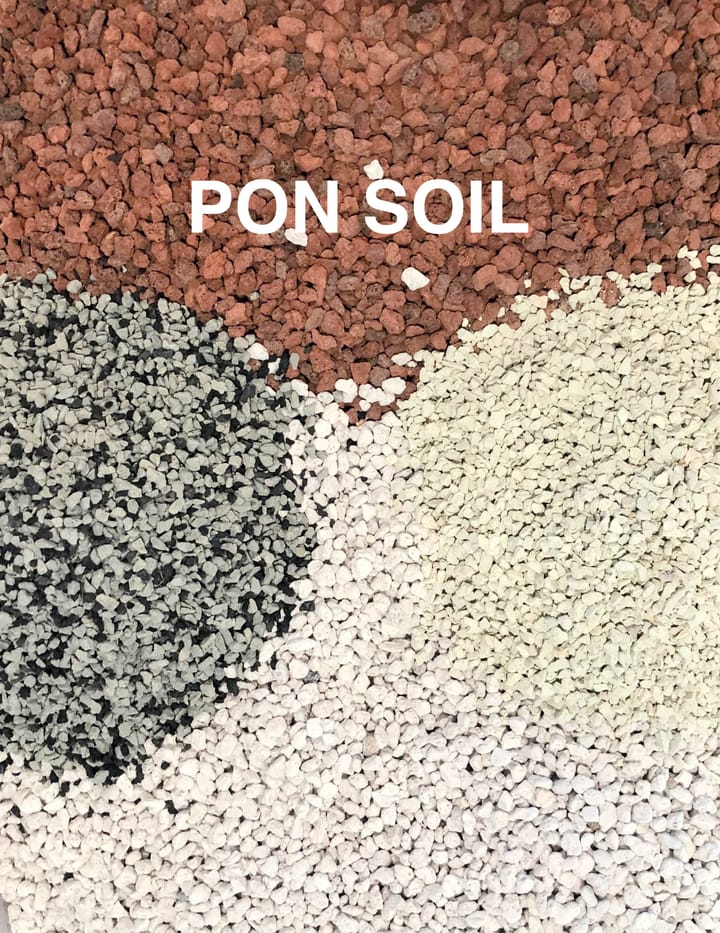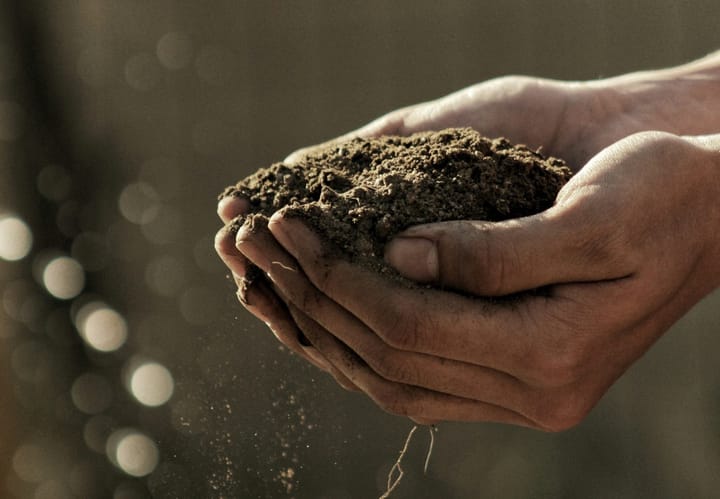Charcoal
Charcoal, typically associated with barbecues and art supplies, also has a significant role in gardening. It's a versatile addition to the garden that can improve soil health and plant growth.
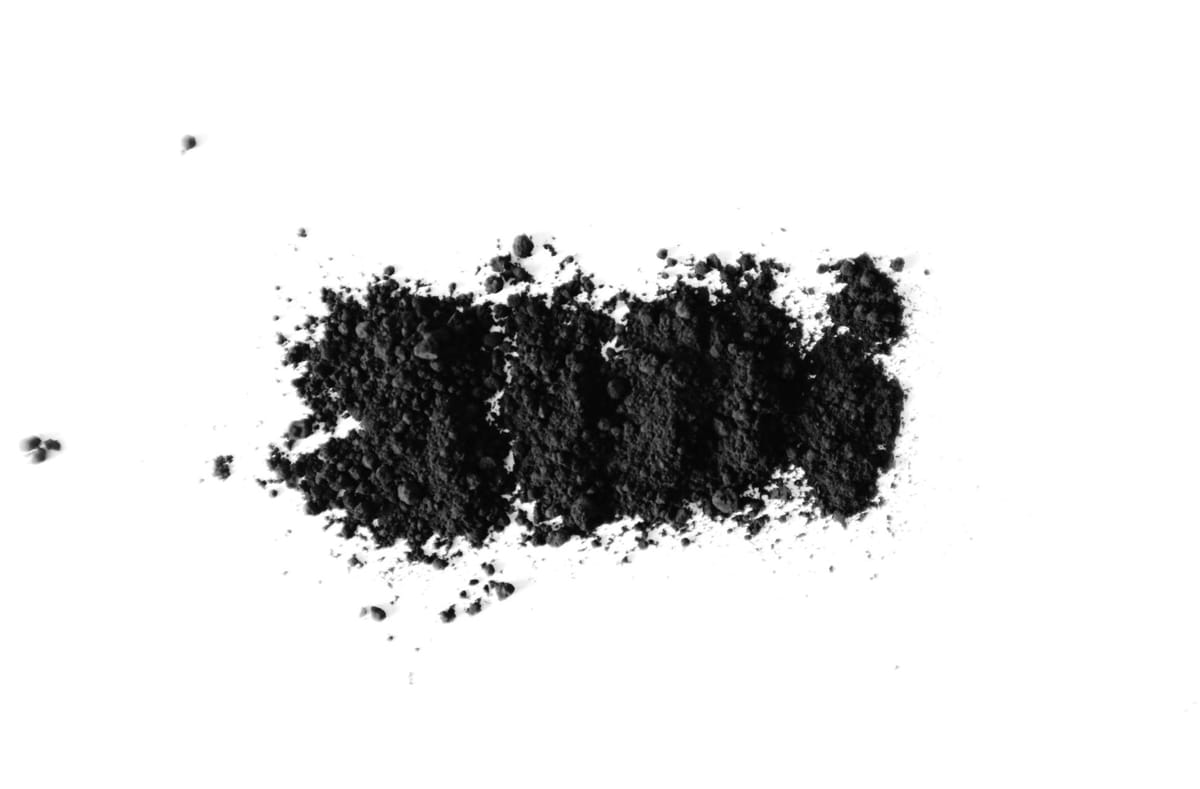
The use of charcoal in gardens is not a new concept. For centuries, gardeners have discovered its benefits for soil enhancement.
The key lies in its porous nature, which enables it to retain water and nutrients, making them readily available to plants.
This same characteristic also helps in providing better aeration to the soil, thereby encouraging healthy root development.
There are different types of charcoal used in gardening, including horticultural charcoal, activated charcoal, and lump charcoal. Each type has its own properties and uses.
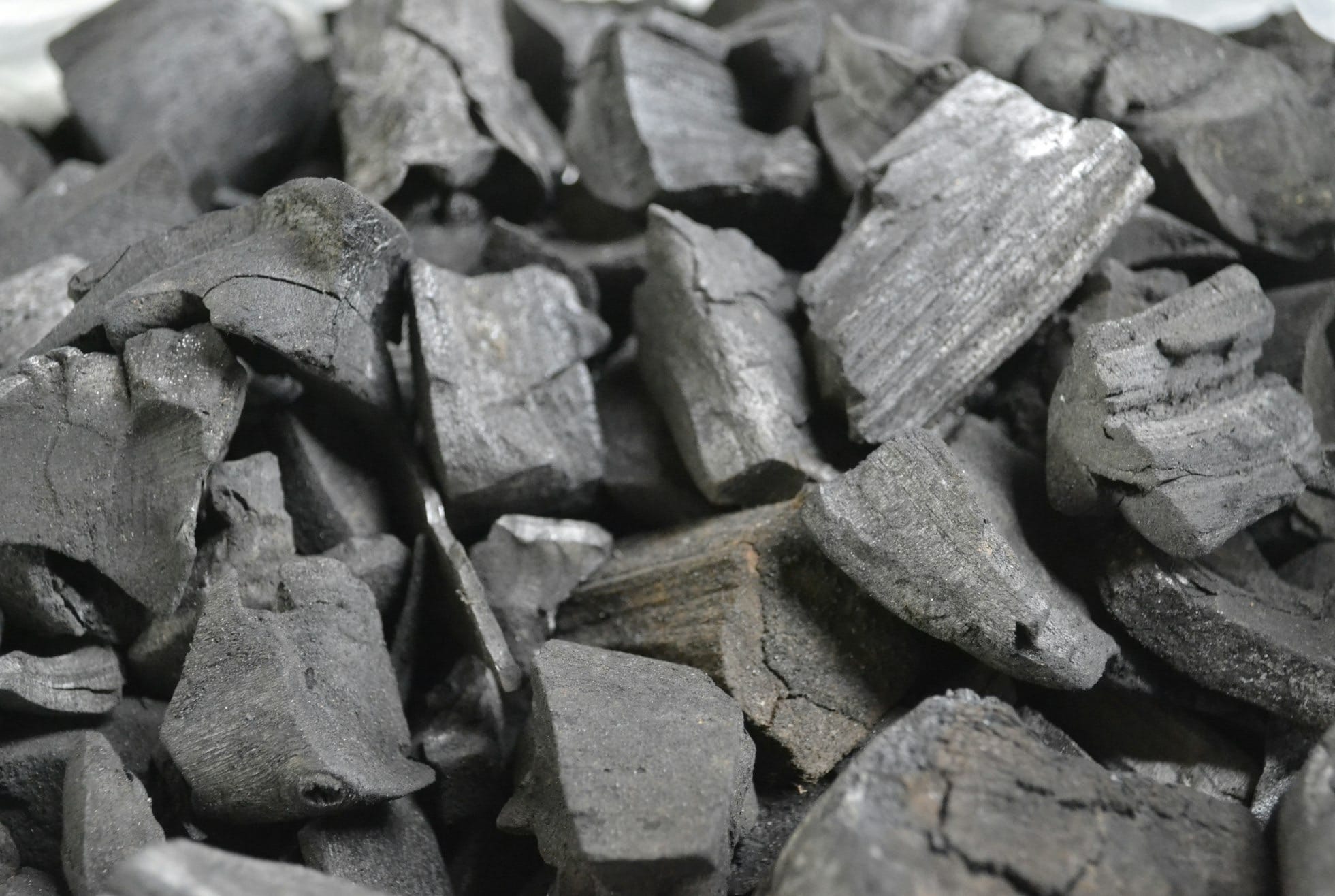
Horticultural charcoal, for example, is often used in potting mixtures for its ability to improve soil structure.
Activated charcoal, on the other hand, has high adsorptive properties that help in removing toxins and odors from the soil.
Lump charcoal, which is more commonly used for grilling, can also be used in garden soil to improve drainage and aeration.
Key Takeaways
- Charcoal improves soil health by retaining water and providing aeration.
- Different types of charcoal serve specific functions in gardening.
- Using charcoal is an age-old practice that supports plant growth and soil enhancement.
Benefits of Charcoal in Gardening
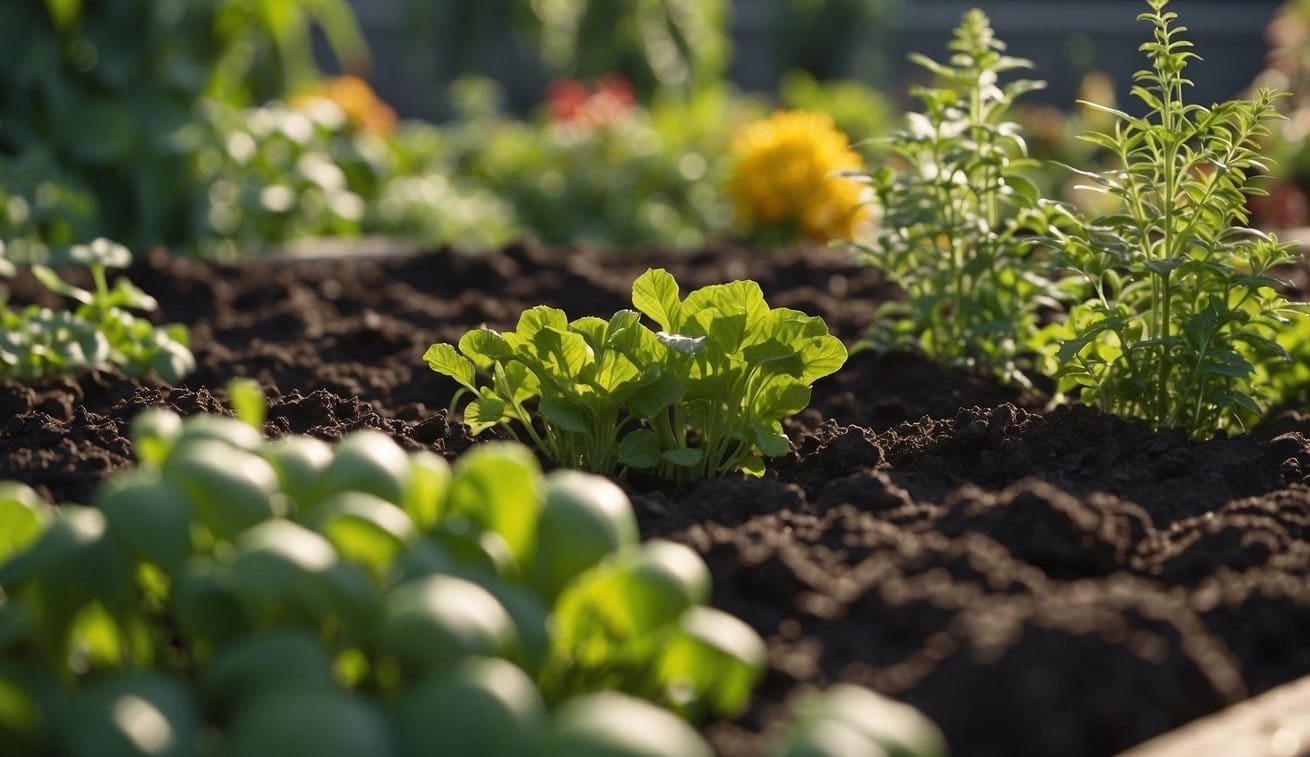
Charcoal can be a powerful ally in your garden, providing a range of improvements to your soil that can lead to healthier plants and better growth.
It works to enhance the soil's structure, fertility, and ability to hold water while ensuring proper drainage.
Improving Soil Structure
Adding charcoal to your soil can significantly improve its structure or the way soil holds together.
It helps in creating a more porous soil, which means that air and water can move through it more easily.
This is good for your root systems, as they need air to be healthy. A well-aerated soil also prevents soil compaction, allowing roots to expand more freely.
- Porosity: Increases the number of tiny holes in the soil for air and water.
- Aeration: Helps roots get the air they need.
- Reduced Compaction: Prevents soil from becoming too dense.
Enhancing Soil Fertility
Charcoal in the soil acts as a repository of nutrients that can otherwise be washed away by rain or irrigation.
It retains these nutrients near the root zone where plants can access them when needed, thus enhancing soil fertility.
With better nutrient retention, your plants can absorb more organic material, which is converted into growth and health.
- Nutrient Availability: Keeps important nutrients within reach of plant roots.
- Nutrient Retention: Prevents nutrients from being easily washed away.
Water Retention and Drainage
Charcoal can help your garden retain water while also improving drainage, a helpful balance that can be hard to achieve.
It can hold onto water, thus increasing water retention and providing moisture to your plants over time.
Simultaneously, it ensures that excess water drains away, reducing risks of overwatering and root rot.
- Water Retention: Helps soil hold onto moisture for plants to use.
- Drainage: Ensures extra water flows through, preventing waterlogged conditions.
Types of Charcoal and Their Properties
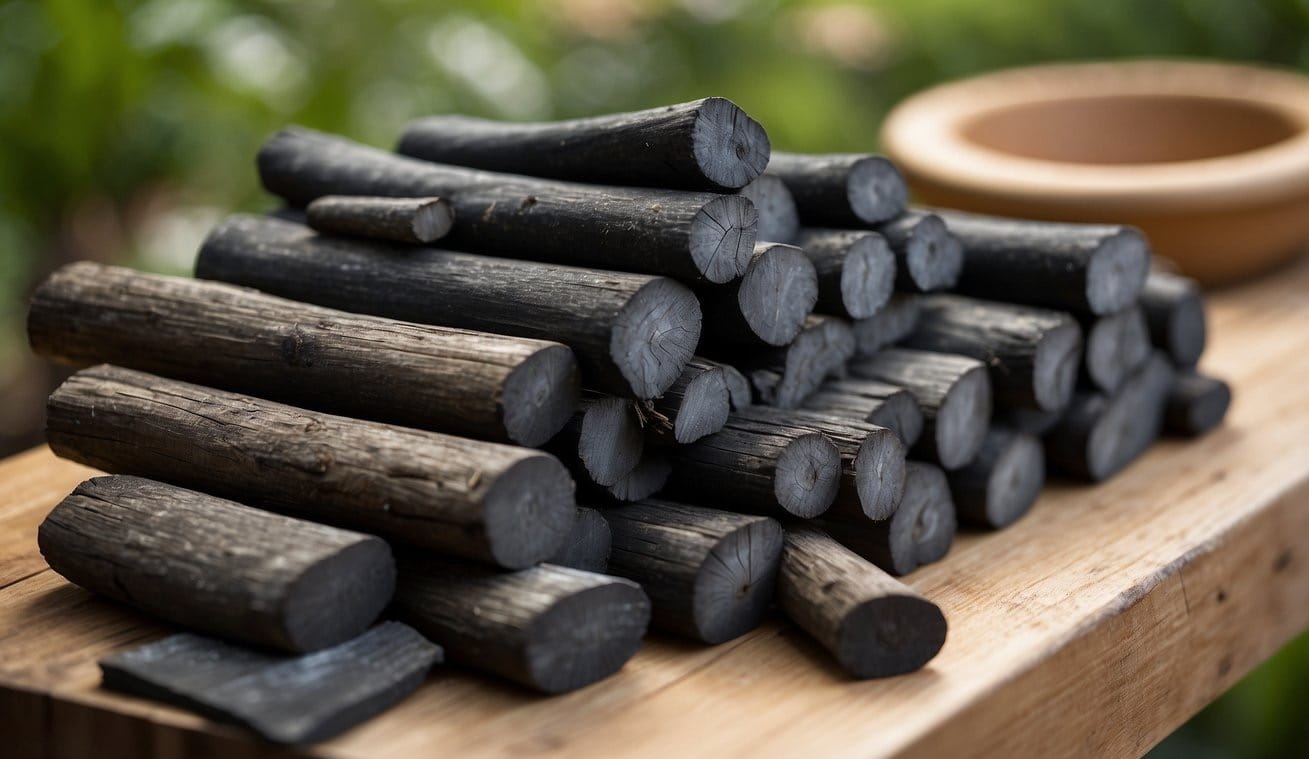
Different types of charcoal are used in gardening, each with specific benefits. Knowing their key attributes can help you make an informed choice for your soil needs.
Biochar and Its Production
Biochar is a type of charcoal that's produced particularly for use in soil improvement.
It's made by heating organic materials such as wood, manure, or leaves in a controlled environment with little oxygen—a process known as pyrolysis.
Here are some of its properties:
- Carbon-rich: Enhances soil by adding carbon and improving nutrient retention.
- Porous structure: Creates spaces in the soil that hold water and allow roots to breathe.
- Carbon sequestration: Locks carbon into the soil, helping in reducing greenhouse gases.
Biochar's production aims to create a stable form of carbon, called terra preta, which was originally found in the Amazon region and is known for its remarkable fertility.
Horticultural Charcoal
Horticultural charcoal is typically made from hardwood. Unlike other forms, it's not processed as extensively, which preserves more of its natural structure. Its properties include:
- Natural soil conditioner: Introduces beneficial nutrients to the soil when used.
- Improves drainage and aeration.
- Free of additives: Often a pure form of charcoal without chemical additives.
This charcoal type is ground into smaller pieces for ease of mixing with soil and making the benefits accessible to plants.
Activated Charcoal
Activated charcoal is known for its extremely porous structure. Here’s how it’s distinct:
- Highly porous: Can help trap impurities, keeping soil cleaner.
- Made from various materials: Including wood and coconut shells.
- Used in filters: Its ability to absorb toxins makes it useful for air and water filtration.
Activated charcoal is processed at higher temperatures with activating agents to expand its surface area, making it more potent than horticultural charcoal for specific applications.
It’s not the typical choice for general soil improvement but can be used for specialized needs.
Charcoal as a Soil Amendment
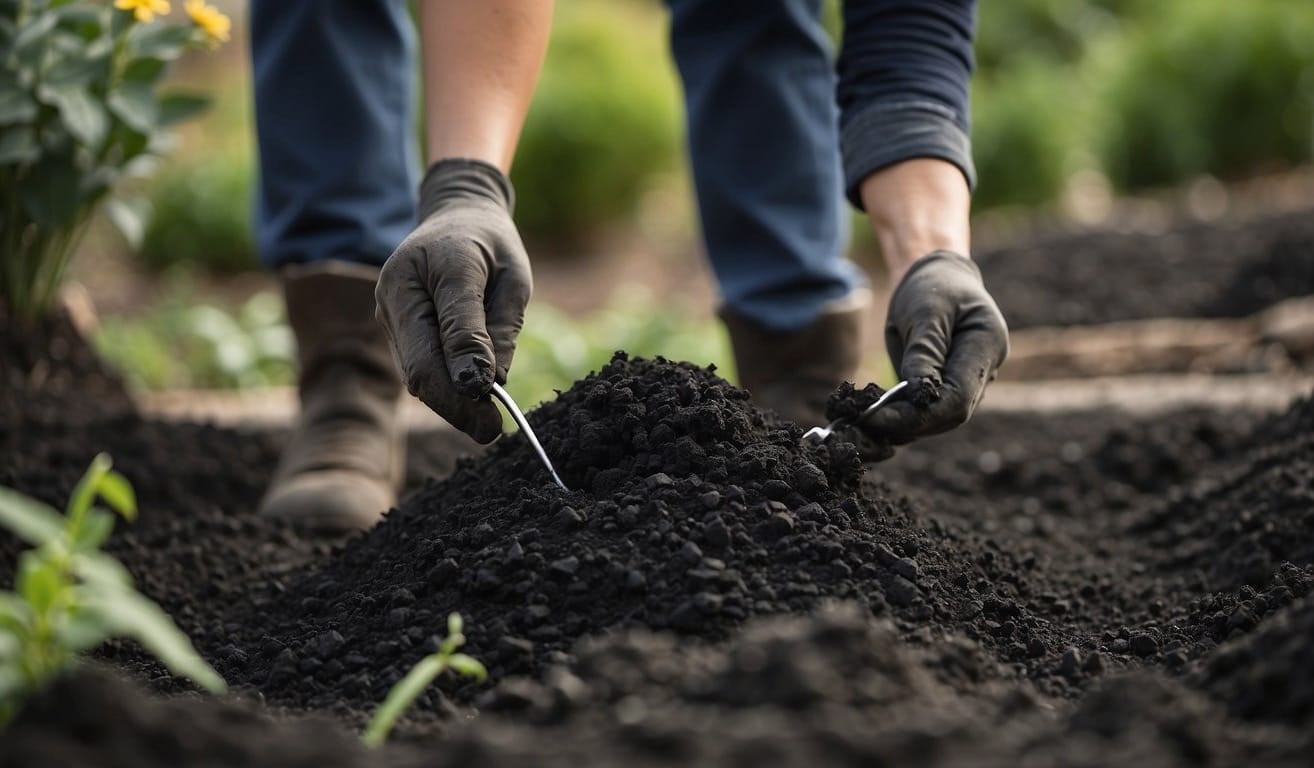
Charcoal can influence your garden's soil acidity and work with organic waste to improve your plants' environment.
Adjusting Soil pH
You may find your garden soil is too acidic or alkaline, affecting plant health. Charcoal can be a tool to moderate pH levels. Here's how it works:
- Moderating Soil Acidity: If you have acidic soil, adding charcoal can raise the pH, moving it towards neutral. This is beneficial for plants that do not thrive in highly acidic conditions.
- Maintaining pH Balance: Over time, charcoal can help maintain a stable pH in your garden soil. Unlike other amendments that might quickly alter pH, charcoal works more gradually.
It's essential to monitor the pH level after adding charcoal, so you don't shift the balance too far. You can use a simple pH test from a gardening store to track any changes.
Organic Waste Composting
Incorporating charcoal into your compost pile can lead to several benefits. Here's what you need to know:
- Enhancing Compost Quality: Charcoal's porous nature helps with aeration and retains nutrients from compost materials like manure and kitchen scraps.
- Retention of Nutrients: Charcoal can hold onto nutrients such as potassium and calcium, releasing them slowly into the soil and making them available to your plants over time.
- Improving Potting Mix: When mixed with potting soil, charcoal can improve its quality, making the potting mix more conducive to growing healthy plants.
Remember to use charcoal sparingly in your compost. Too much can interfere with the balance of materials, so it's best to add it in layers as your compost pile grows.
Charcoal's Role in Plant Growth
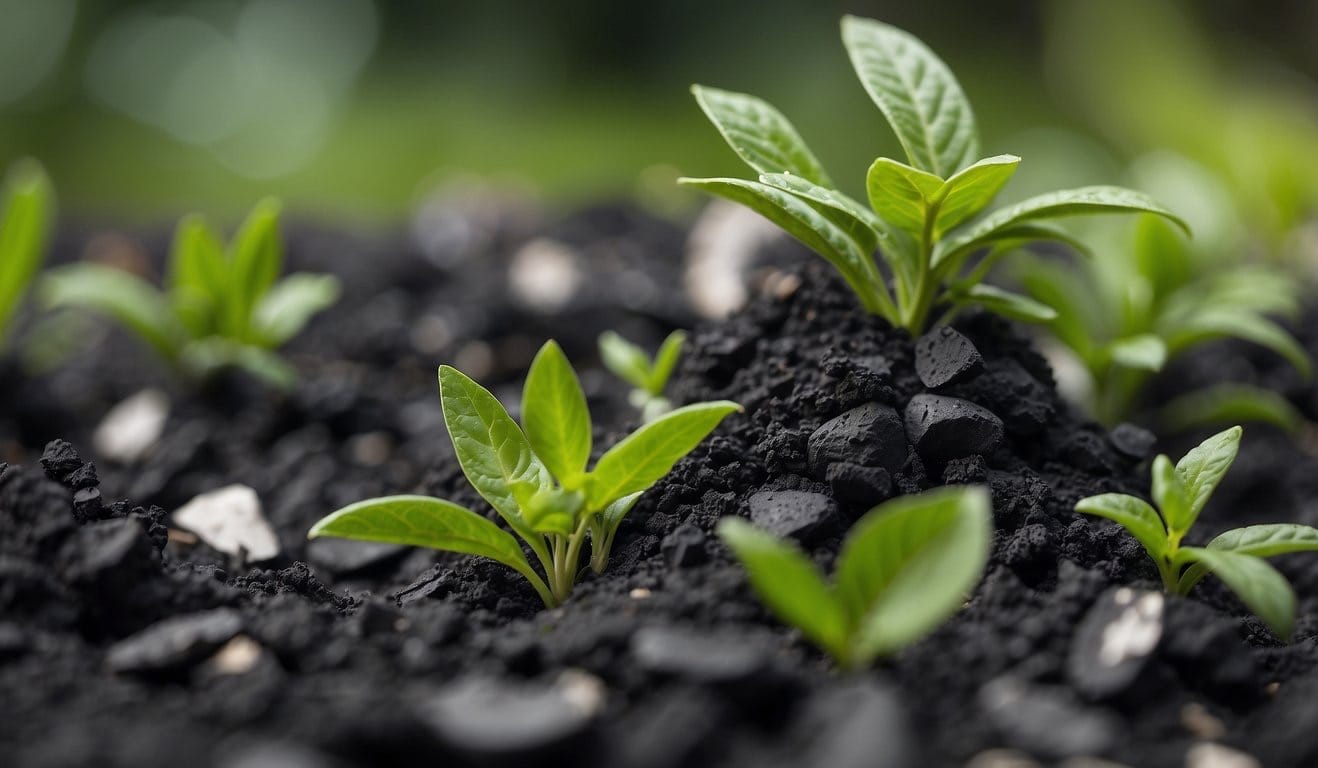
Charcoal in the garden plays a critical role by fostering a healthier root environment for your plants.
It supports the minute life forms that plants rely on, and also offers protection against certain plant diseases.
Supporting Beneficial Microbes
When you add charcoal to your garden soil, it acts like a sponge for organic matter. This isn't just good for holding nutrients; it also creates a perfect home for beneficial microorganisms.
These tiny helpers, such as bacteria and fungi, are crucial for your plants' health.
They break down organic material, making nutrients available to plant roots, and even help increase oxygen levels in the soil.
This not only boosts plant vigor but can also speed up growth.
Benefits for your garden soil with charcoal:
- Nutrient Retention: Holds nutrients that plants can use.
- Microhabitat: Provides a home for soil microbes like bacteria and fungi.
- Aeration: Improves soil structure, leading to better oxygen availability.
Protecting Plants from Diseases
Your plants are always at war with various nematodes and fungal diseases. Charcoal can be your secret weapon to help protect them.
Its unique structure can absorb excess moisture that often harbors harmful fungi and nematodes. With its ability to house good microbes, charcoal also helps these friendly forces outcompete the harmful ones, reducing the chances of disease.
By maintaining a balanced moisture level in the soil, charcoal is instrumental in creating an environment that's less inviting to the causes of your plants' sickness.
How charcoal aids in disease prevention:
- Moisture Balance: Keeps the soil from being too wet, which can lead to disease.
- Competitive Exclusion: Encourages good microorganisms that can outcompete harmful ones.
- Toxin Removal: May help absorb substances harmful to plants.
Environmental Impact and Sustainability
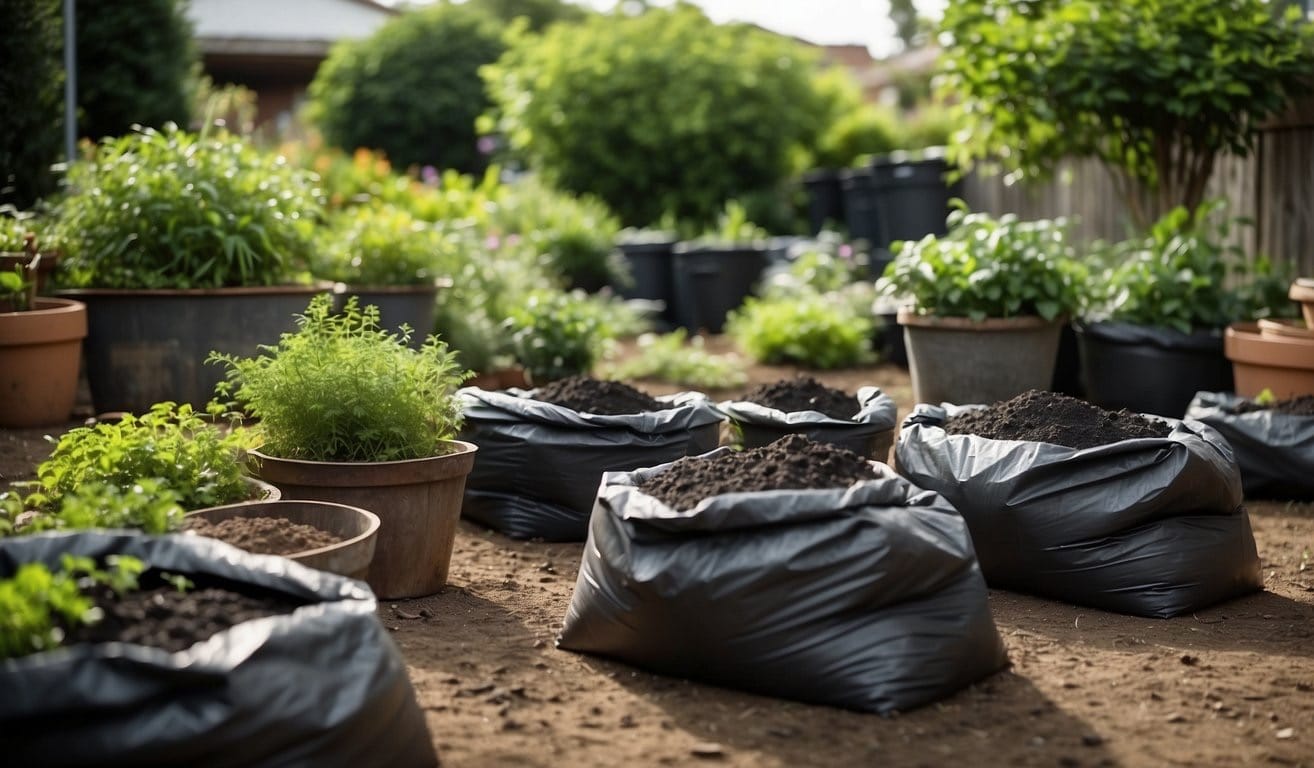
Charcoal plays a dual role in gardening, both aiding in plant growth and interacting with environmental processes.
Its usage in soil management reflects on sustainability efforts and climate change mitigation.
Carbon Footprint Mitigation
Your garden can be a carbon sink, capturing more carbon dioxide (CO2) than it releases.
By using biochar, a form of charcoal produced through the pyrolysis of biomass, you enhance your soil’s ability to sequester carbon.
This process locks carbon in the soil for hundreds to thousands of years. Biochar also improves soil health, reducing the need for chemical fertilizers and their associated emissions.
- Key Benefits of Biochar in Gardens:
- Enhanced carbon sequestration
- Improved soil health
- Reduced need for chemical fertilizers
Reduction of Greenhouse Gas Emissions
The use of charcoal in your garden, specifically biochar, contributes to the reduction of greenhouse gas emissions.
Charcoal has adsorption properties that enable it to retain nutrients and water.
This lowers the total greenhouse gases released during gardening activities. By doing so, you're contributing to the reduction of the overall carbon emissions from the agricultural sector.
Additionally, sustainable production methods, such as using waste biomass for creating charcoal, help in minimizing the environmental impact even further.
- How Charcoal Reduces Greenhouse Gases:
- Retains water and nutrients in the soil
- Lowers methane and nitrous oxide emissions
- Decreases reliance on fossil-fuel-based fertilizers
Practical Gardening Applications
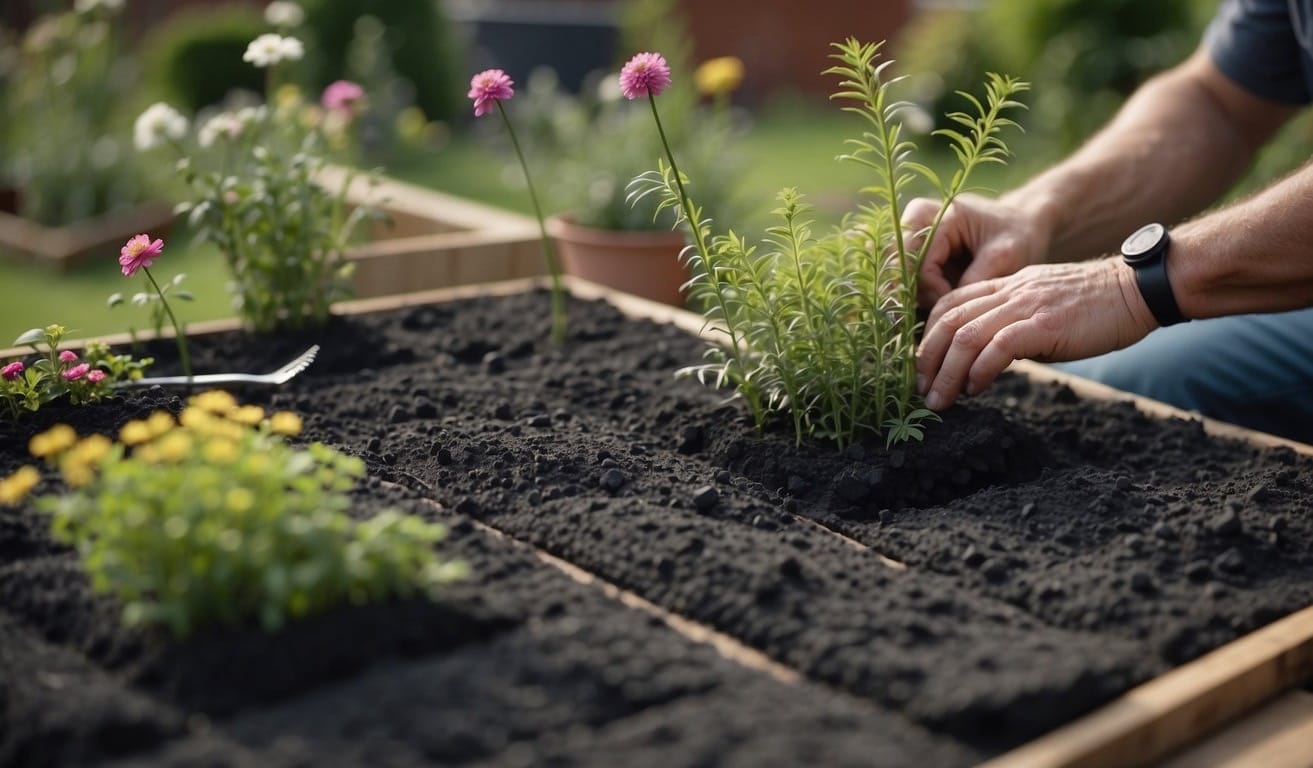
Charcoal can be a valuable element in your garden care routine, especially for boosting soil quality and plant health.
It serves as a soil amendment in potting mixes and as a protective layer in your garden.
Incorporation in Potting Soil Mixes
When you mix charcoal into your potting soil, it helps in several ways.
Charcoal improves drainage and prevents water from pooling at the bottom of pots, which can harm the roots of your potted and indoor plants.
This is particularly relevant for terrariums, where excess moisture can lead to fungal growth.
Here's how to use charcoal in your potting mixes:
- Select the right charcoal. Horticultural charcoal is best.
- Break it into small pieces if it's not already sized appropriately.
- Mix it with your potting soil. A good ratio is about 1 part charcoal to 10 parts potting soil.
Mulching and Protective Layers
Charcoal acts as a protective mulch for home gardens. It retains moisture, suppresses weeds, and over time, breaks down and enriches the garden soil with nutrients.
To use charcoal as mulch:
- Spread a thin layer of charcoal on the soil surface around your plants.
- Ensure the pieces are large enough so they won't be blown away by the wind but small enough to form a layer that covers the soil efficiently.
- Replenish the charcoal layer as needed, usually once a season.
Charcoal in Permaculture and Organic Gardening
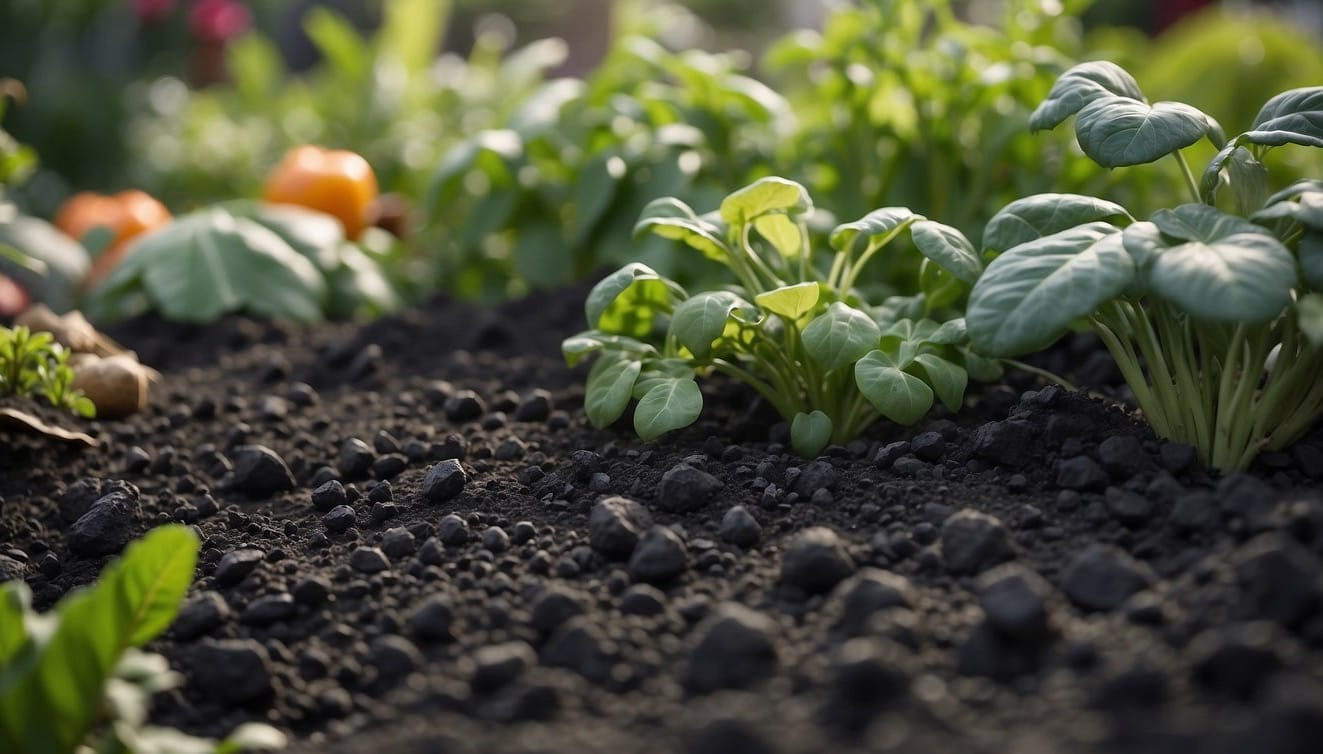
Charcoal plays an influential role in enhancing soil health and improving crop yields within both permaculture design systems and organic gardening practices.
Enhancing Permaculture Practices
Permaculture systems thrive on the careful design and maintenance of agriculturally productive ecosystems that have the diversity, stability, and resilience of natural ecosystems.
Your use of charcoal, particularly biochar, can be instrumental in these systems.
Biochar is a stable form of organic matter created by heating wood or other plant material (biomass) in an environment with little to no oxygen, a process known as pyrolysis.
- Benefits to Soil: Biochar helps create fertile soil by improving its structure, increasing water retention, and aiding microbial life which is key for nutrient cycling.
- Compost Tea Enhancer: When mixed into compost tea, charcoal acts as a catalyst, boosting its efficacy and distributing its benefits more evenly throughout your permaculture gardens.
- Toxin Removal: It binds to toxins in the soil, reducing their availability to plants and microbes, promoting a healthier ecosystem.
Organic Gardening and Crop Yields
For your organic garden, utilizing charcoal can significantly enhance crop yields by creating a more productive soil environment without relying on synthetic chemicals.
- Soil Fertility: Charcoal enriches the soil with essential nutrients, encouraging the growth of an array of beneficial bacteria and fungi which contributes to the overall soil health.
- Water Use: It reduces water loss by holding onto moisture which can be particularly beneficial during dry spells, ensuring your plants get the water they need without constant watering.
- Pest Resistance: Healthy plants grown in charcoal-amended soils often exhibit improved resistance to pests and diseases, reducing the need for interventions.
Considerations When Using Charcoal
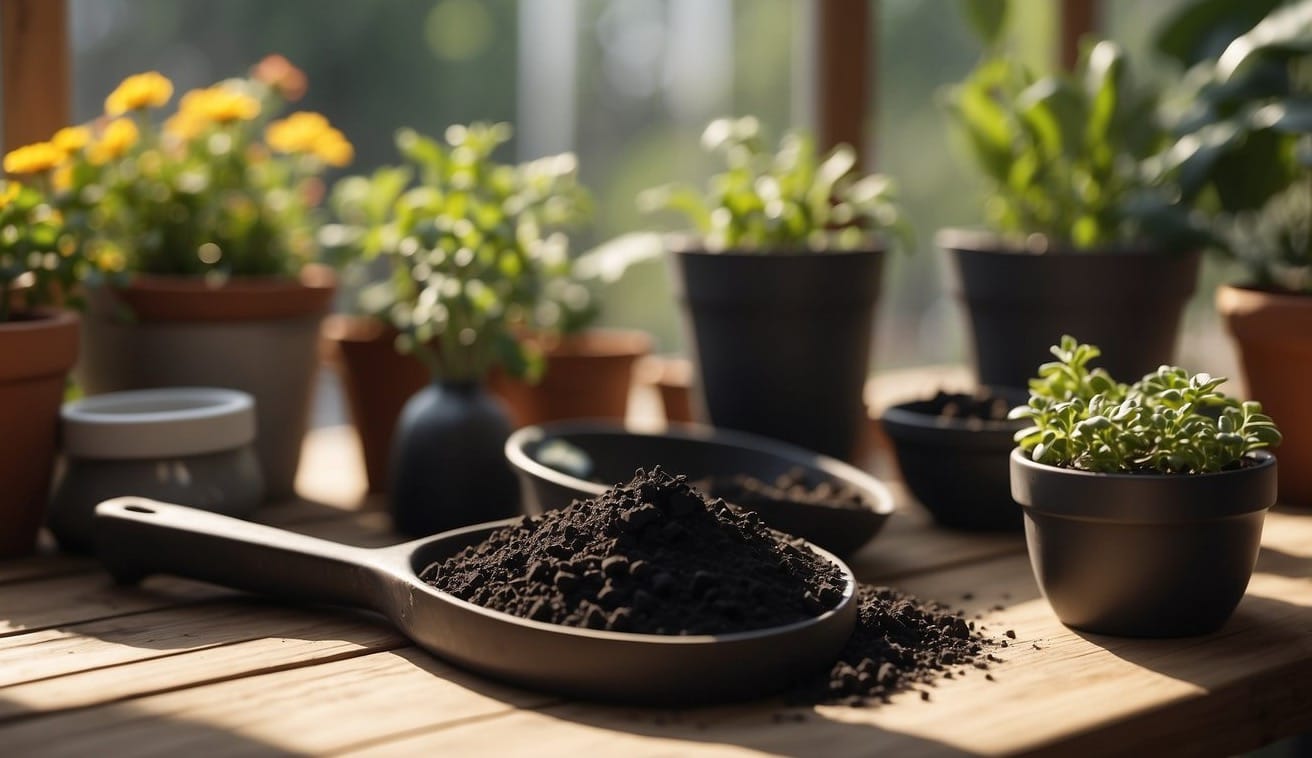
Using charcoal in your garden can lead to better plant growth and soil health. However, it's important to apply it wisely and be aware of the potential downsides.
Effective Usage and Application Rates
To achieve the best results, mix charcoal into your soil at a recommended ratio. A common suggestion is a 1:10 ratio of charcoal to soil.
This balance is crucial to improve soil structure, enhance moisture retention, and avoid nutrient leaching.
While charcoal can be an effective soil additive, using too much can lead to a decrease in soil pH, making it too acidic for some plants.
Begin by determining the size of the area you intend to treat with charcoal. Here's a simple guide:
- For potting soil: 1 part charcoal to 10 parts soil
- For garden beds: 10 to 15 pounds of charcoal per 1,000 square feet of soil
By adhering to these rates, you'll provide enough charcoal to benefit your plants without risk of over-application.
Potential Disadvantages
While charcoal has its benefits, there are risks and disadvantages to consider:
- Acidity: Too much charcoal can make your soil acidic, potentially harming your plants.
- Overwatering: Charcoal improves drainage, but this can also mean increased risk of overwatering if not monitored.
- Nutrient Leaching: Excess use might cause nutrients to leach away, leaving soil less fertile.
- Price: Depending on the type and source of charcoal, this additive can be an added expense to your gardening budget.
Regularly check the condition of your soil and plants to ensure that the charcoal is having the desired effect. Adjust your use of charcoal according to the observed impact on your garden's health.
Purchasing and Preparing Charcoal for Gardening
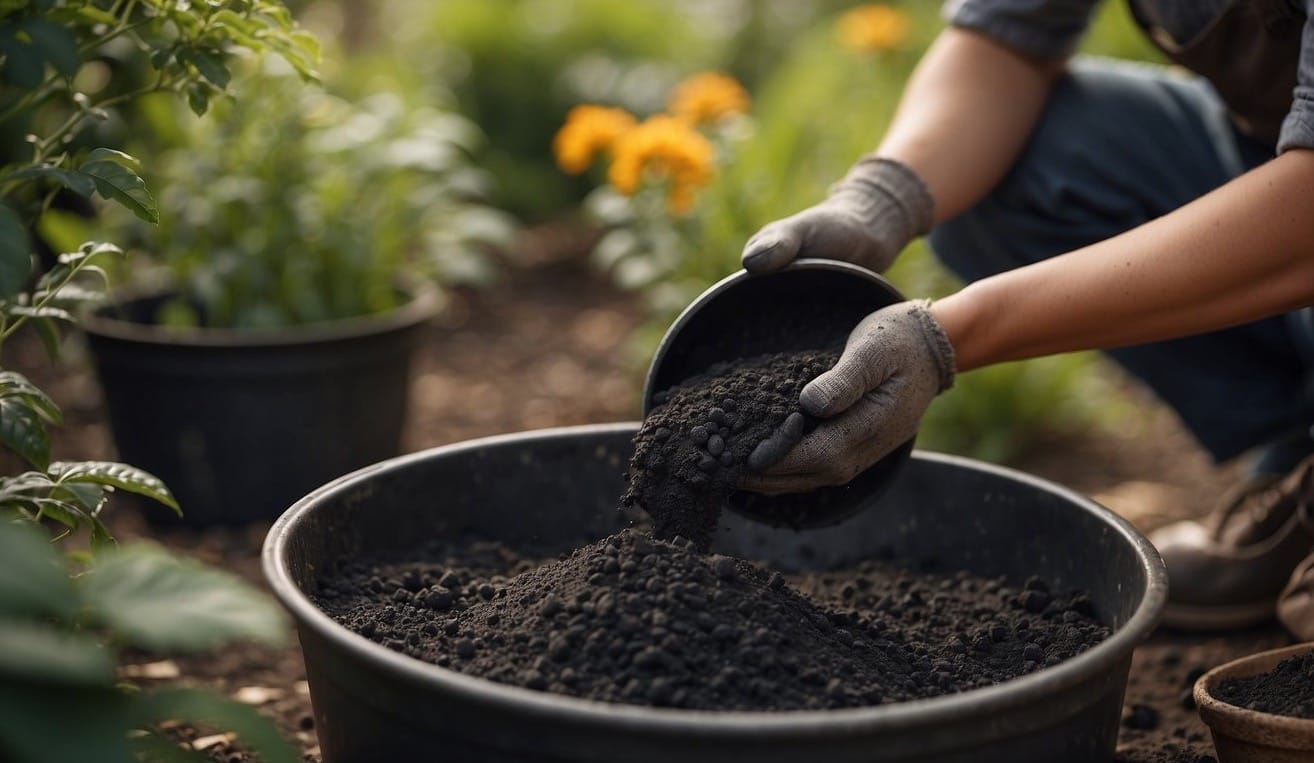
When you're looking to improve soil health, the type of charcoal you buy and how you prepare it can make a significant difference.
Here, you'll discover what to consider when selecting charcoal and the necessary steps for safe preparation and handling.
Selecting the Right Type
To benefit your garden, it's crucial to choose the appropriate kind of charcoal.
Look for horticultural charcoal or activated charcoal, which are specific types meant for gardening purposes.
Avoid lump charcoal or the kind used for barbecues as they can contain harmful additives.
Horticultural Charcoal:
- Often derived from materials like wood chips, coconut shells, or peat.
- It is processed to be safe for use with plants.
Activated Charcoal:
- Has increased surface area and pore size due to additional processing.
- It's excellent for absorbing toxins from the soil.
When purchasing charcoal, consider these aspects in a simple checklist:
- Type: Ensure it is horticultural or activated charcoal.
- Source: Preferably from sustainable, organic materials such as wood chips.
- Additives: Confirm that there are no chemical additives that could harm your plants.
Preparation and Handling Safety
Before adding charcoal to your soil, proper preparation is important for both the safety of your garden and personal handling.
- Wear gloves: While charcoal is generally safe, gloves will keep your hands clean and protect from any dust.
- Rinse the charcoal: This will remove any dust or small particles that could affect soil aeration or water drainage.
- Crush if necessary: Larger pieces of horticultural charcoal should be broken down to improve the mixture with soil.
- Mix with other amendments: Charcoal works best when mixed with other organic matter like terra preta or perlite. This creates a balanced soil environment.
| Step | Action |
|---|---|
| 1 | Wear gloves for protection |
| 2 | Rinse charcoal under water |
| 3 | Crush to desired size |
| 4 | Mix with soil amendments |
Frequently Asked Questions
Charcoal in gardening can enhance soil properties and benefit plant health. It's important to understand how to apply it and what types of charcoal are safe for your garden.
How to use charcoal for gardening purposes?
To use charcoal in your garden, mix small pieces into the soil. This helps with drainage and moisture retention. Crushed charcoal can be added to the bottom of pots for indoor plants as well, promoting healthy root growth.
What are the benefits of charcoal in the garden?
Charcoal improves soil structure by increasing its porosity and ability to hold nutrients. Plants in soil with charcoal may face fewer diseases as it also helps in reducing soil pathogens.
What is the difference between horticultural charcoal and regular charcoal?
Horticultural charcoal is processed to remove impurities and is specifically made for gardening use. Regular charcoal, especially the type used for grilling, may contain harmful substances that aren't safe for plants.
Can you use BBQ charcoal ash for plant health?
BBQ charcoal ash should not be used in your garden as it can contain harmful chemicals. Only charcoal without additives is safe for gardening. Even then, ash is not recommended due to its potential high alkalinity.
What types of plants benefit from the use of charcoal?
Plants that thrive in well-drained, nutrient-rich soils can benefit from charcoal. This includes a wide variety of vegetables, flowers, and succulents. They benefit from improved soil aeration and water retention.
How can one make their own charcoal for the garden?
Making your own garden charcoal involves burning hardwood in a low-oxygen environment. This process is called pyrolysis. Once cooled, crush it into small pieces before mixing into garden soil.
